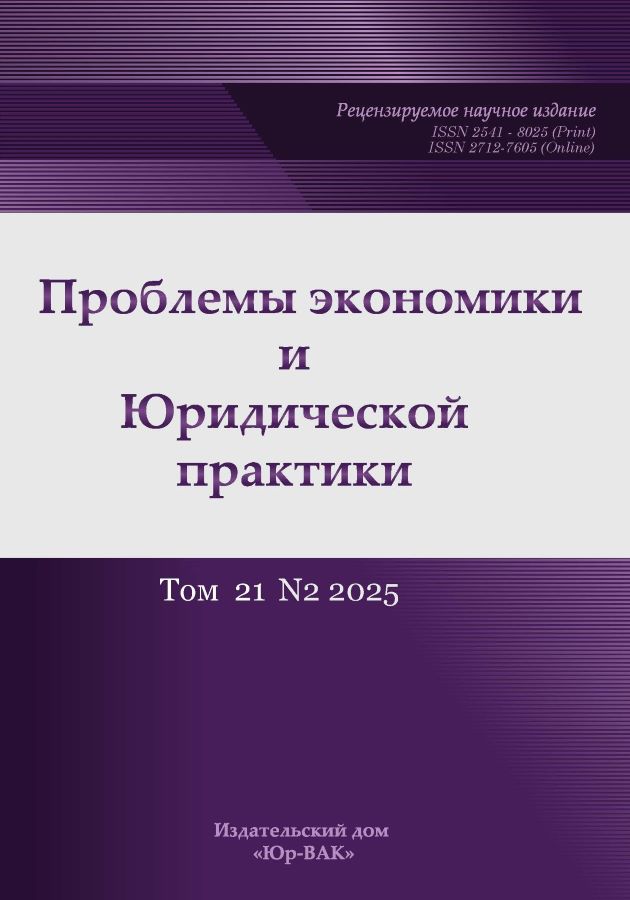Participatory Budgeting as a Tool for the Participation of Citizens in the Process of Distributing Municipal Finances: Russian and Foreign Experience in Legal Regulation
- Authors: Lapshin I.S.1, Abgarian J.R.1
-
Affiliations:
- Synergy Moscow University for Industry and Finance
- Issue: Vol 21, No 2 (2025)
- Pages: 73-79
- Section: Public Law (State and Legal Sciences)
- URL: https://journals.eco-vector.com/2541-8025/article/view/680452
- EDN: https://elibrary.ru/IWSLEX
- ID: 680452
Cite item
Abstract
The article is dedicated to the study of participatory budgeting as a tool for engaging citizens in the allocation of municipal finances. The relevance of the topic is driven by the growing demand for transparency and democratization of governance, as well as the inclusion of participatory budgeting in strategic documents of the Russian Federation. The purpose of the study is to analyze the theoretical foundations, Russian and foreign experiences in implementing participatory budgeting, identify problems in its legal regulation, and develop recommendations for its improvement. The methodology includes comparative legal analysis, the study of regulatory legal acts, scientific literature, and the generalization of practices. The authors highlight the key principles of participatory budgeting: transparency, citizen involvement, and accountability. Successful foreign cases (Brazil, Europe, Asia) are considered, emphasizing the role of adaptation to local conditions. In Russian practice, positive effects are noted, such as an increase in the number of implemented projects. However, systemic problems are identified: limited scale, social passivity, technological inequality, and a lack of competencies in municipal bodies. Concrete measures are proposed to address them: the adoption of a federal law on participatory budgeting, the establishment of a minimum share of funding, integration into national projects, digitalization of processes, educational programs for citizens and officials, and others. The necessity of taking into account regional specifics and developing feedback mechanisms is emphasized. The study confirms that participatory budgeting contributes to strengthening trust between the government and society and increases management efficiency but requires systemic support at the legislative and institutional levels. Further digitalization and adaptation of foreign experience are identified as promising areas.
Full Text
About the authors
Ivan S. Lapshin
Synergy Moscow University for Industry and Finance
Author for correspondence.
Email: lapshin74@mail.ru
ORCID iD: 0000-0003-3942-1657
SPIN-code: 5642-1031
Cand. Sci. (Law), Associate Professor of the Department of State and Legal Disciplines and Digital Law
Russian Federation, MoscowJulietta R. Abgarian
Synergy Moscow University for Industry and Finance
Email: jettaabgarian@yandex.ru
ORCID iD: 0000-0002-5182-4208
SPIN-code: 5301-2525
Cand. Sci. (Law), Associate Professor of the Department of State and Municipal Governance
Russian Federation, MoscowReferences
- Bakhtigareeva, E. N. (2020). Initiative budgeting at the municipal level: Theoretical and regulatory legal aspects. Elektronnyy nauchnyy zhurnal «Vektor ekonomiki», 11, 39.
- Belova, E. E. (2022). Regulatory and legal support of initiative budgeting in the Russian Federation and in the territory of the Trans-Baikal Territory. In Upravleniye ekonomicheskimi sistemami: materialy XVI Mezhdunarodnoy nauchno-prakticheskoy konferentsii (pp. 26–35). Zabaykalsky State University.
- Nikitin, K. (2019, March 25). How citizens can participate in the budget process. Vedomosti. Retrieved from https://www.vedomosti.ru/opinion/articles/2019/03/25/797264-kak-pouchastvovat.
- Podgorskaya, S. V., & Miroshnichenko, T. A. (2021). The role of the participatory budgeting mechanism in the development of rural territories (on the example of the Rostov region). Melioratsiya i gidrotekhnika = Land Reclamation and Hydraulic Engineering, 11(4), 187–206. Retrieved from http://www.rosniipm-sm.ru/article?n=1245 (Accessed: April 13, 2025).
- Bublik, N. D., Lukina, I. I., Fazlutdinov, R. A., & Chuvilin, D. V. (2016). Prerequisites for the formation of the concept of balanced initiatives based on the adaptation of participatory budgeting to the conditions of Russia. Internet-zhurnal Naukovedenie, 8(6), 60.
- Rybakova, S. V. (2022). Initiative budgeting as a new category of budget law. Finansovoe pravo, 5, 12–18.
- Smirnov, D. A. (2021). Financial and legal regulation of initiative budgeting in the subjects of the Russian Federation. Pravovaya politika i pravovaya zhizn, 1, 148. Retrieved from https://cyberleninka.ru/article/n/finansovo-pravovoe-regulirovanie-initsiativnogo-byudzhetirovaniya-v-subektah-rf (Accessed: March 19, 2025).
- Trofimova, Ya. V. (2023). Participatory budgeting in the context of environmental challenges. EKONOMIKA I UPRAVLENIE: NAUCHNO-PRAKTICHESKIY ZHURNAL, 1(169), 37–38.
- Baiocchi, G., & Ganuza, E. (2014). Participatory budgeting as if emancipation mattered. Politics & Society, 42(1), 29–50.
Supplementary files









